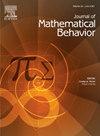混合成绩解题小组中的不同谈话类型:对学生个人组合思维的贡献
IF 1.7
Q3 EDUCATION & EDUCATIONAL RESEARCH
引用次数: 0
摘要
本研究对以往有关数学合作教学法的研究有所贡献。研究的重点是小组中的谈话类型与学生个人的组合思维之间的关系。本研究进行了四项个案研究,研究对象是初中学生中的不同成绩群体,他们在解决组合数学问题时的情况。研究分析了两人和小组合作的视频记录,以及对四名学生(每组一名)的访谈。结果揭示了在不同水平的小组中,不同类型的谈话(探索性谈话、积累性谈话、争论性谈话)中的承受力和制约力如何促进学生的组合思维。结果突出了组合数学中集体推理和个人推理的相互联系,强调了小组谈话质量的作用。本文章由计算机程序翻译,如有差异,请以英文原文为准。
Different types of talk in mixed-attainment problem-solving groups: Contributions to individual students’ combinatorial thinking
This study contributes to previous research on collaborative approaches to instruction in mathematics. The study focuses on the relationships between the type of talk in groups and individual students’ combinatorial thinking. Four case studies of mixed-attainment groups of middle-school students working with mathematical problem solving in combinatorics were conducted. Video-recordings of dyad and group work, as well as interviews with four students (one per group), were analyzed. The results reveal how affordances and constraints in different types of talk (exploratory, cumulative, disputational talk) in mixed-attainment groups can contribute to individual students’ combinatorial thinking. The results highlight the interconnectedness of collective and individual reasoning in combinatorics, emphasizing the role of quality of group talk.
求助全文
通过发布文献求助,成功后即可免费获取论文全文。
去求助
来源期刊

Journal of Mathematical Behavior
EDUCATION & EDUCATIONAL RESEARCH-
CiteScore
2.70
自引率
17.60%
发文量
69
期刊介绍:
The Journal of Mathematical Behavior solicits original research on the learning and teaching of mathematics. We are interested especially in basic research, research that aims to clarify, in detail and depth, how mathematical ideas develop in learners. Over three decades, our experience confirms a founding premise of this journal: that mathematical thinking, hence mathematics learning as a social enterprise, is special. It is special because mathematics is special, both logically and psychologically. Logically, through the way that mathematical ideas and methods have been built, refined and organized for centuries across a range of cultures; and psychologically, through the variety of ways people today, in many walks of life, make sense of mathematics, develop it, make it their own.
 求助内容:
求助内容: 应助结果提醒方式:
应助结果提醒方式:


